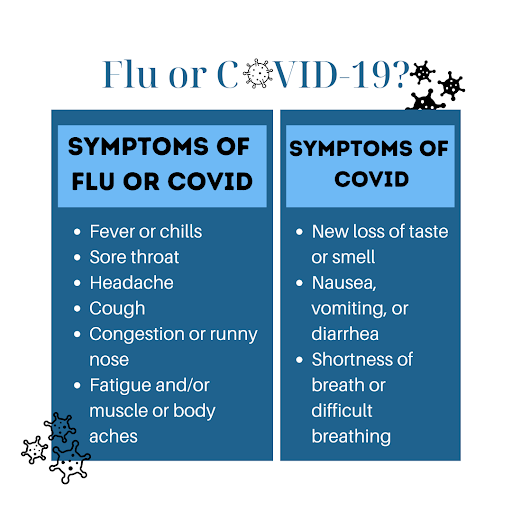Fighting the flu season with COVID-19 lurking

Flu season is upon us and COVID-19 is still surging. The viruses have similar symptoms, but there are a few different ones.
November 23, 2021
Campus life brings people together, and all the togetherness can create many opportunities for respiratory illnesses, such as the flu, to spread. Some people are concerned as the flu season arrives with the ongoing coronavirus pandemic.
“Symptoms of COVID-19 and the flu are very similar, so it is very hard to differentiate,” said Joan Seidel, the Kent City Health Commissioner.
Common symptoms of COVID-19 and the flu are fever, cough, sore throat and having a runny or stuffy nose. These symptoms can be differentiated by the time it takes to experience them. However, Seidel stressed that getting tested is the best way to distinguish between COVID-19 and the flu.
Typically, people experience flu symptoms anywhere from one to four days after infection. On the other hand, a person who experiences COVID-19 symptoms will see them five days after being infected, but symptoms can also appear two to 14 days after infection.
Flu viruses are known to spread rapidly on college campuses, and some students have started taking precautions to aid in staying healthy.
“One of the major steps I have taken to keep myself safe during this season was getting my flu shot,” said Devon Bosko, a senior zoology major.
The DeWeese Health Center currently offers flu shots. Local pharmacies like CVS or Walgreens are other places for students to receive a flu vaccine as well.
“The best preventative for influenza is the flu vaccine,” Seidel said.
Getting a flu shot protects people from contracting the flu, and it’s essential to preventing the spread. Staying healthy during the winter months is important, especially with both viruses, COVID-19 and the flu, looming.
“I still continue to wear my mask in public places, such as grocery stores and in classes, wash my hands frequently and [I] always keep hand sanitizer on me,” Bosko said.
Boosting one’s immune system is also an ordinary precaution people take to prevent contracting the flu. There are plenty of ways to build immune systems, like getting plenty of rest, eating nutritious meals, exercising regularly, spending time outdoors and maintaining good hand hygiene.
Taking vitamin C supplements is another precaution people tend to take to keep one’s immune system strong.
“Having a strong immune system is helpful, but that doesn’t necessarily mean because you take high dose vitamin C that you are going to be able to fight off the flu if you are exposed to it,” Seidel said.
Haley Kisling is a reporter. Contact her at [email protected].
























